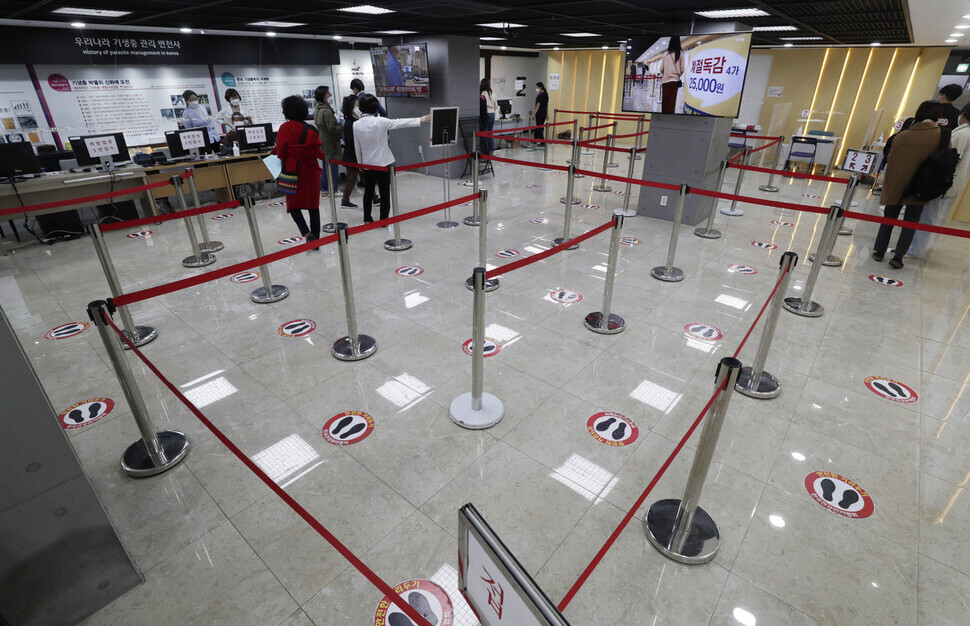hankyoreh
Links to other country sites 다른 나라 사이트 링크
9 Koreans have died after receiving flu vaccination

The Korea Disease Control and Prevention Agency reported on Oct. 21 that nine people have died after being vaccinated for the flu. Experts in infectious diseases and immunological disorders on the KDCA’s committee for investigating vaccination side effects discussed the six deaths that had been reported as of Wednesday morning, but concluded that the situation doesn’t call for suspending vaccinations. Committee members said that a direct causal link has not been determined between adverse reactions after vaccination and the deaths.
“So for, a total of nine cases have been reported, and epidemiological surveys and autopsies are currently underway for seven of those cases,” KDCA Director Jung Eun-kyeong said during an emergency briefing on Wednesday afternoon. “We are checking to see whether people who were inoculated with vaccines from the same batch at the same hospital on the same day have experienced an adverse reaction.”
The nine deaths reported on Wednesday occurred between two and a half hours and 85 hours after inoculation. The deaths were all reported in different areas (including Seoul, Gyeonggi Province, Daegu, Daejeon, and Jeju), following inoculation with vaccines made by different manufacturers (including GC Pharma, Boryung Biopharma, LG Chem, SK, and Korea Vaccine).
But since two of the reported deaths may have been caused by anaphylaxis, a severe allergic reaction that appears several hours after being exposed to certain medications, the KDCA is looking further into patients’ medical records. The KDCA recommends that patients remain at the hospital for about half an hour after being vaccinated in order to ensure they do not experience anaphylaxis or some other adverse reaction.
The KDCA also said there were a total of 25 deaths following flu vaccinations between 2009 and 2019. The vaccine was determined to be the cause of death in only one of those instances, a 65-year-old woman who died in 2010; as a result, her family was given financial compensation.
The annual number of suspicious deaths following vaccination has remained between zero and two in recent years (aside from eight in 2009 and five in 2014). The KDCA believes that the number of deaths reported this year has spiked because of an overall increase in reports. There have been considerable fears and concerns about this year’s vaccine amid reports about unusual white particles and about some shipments of doses being transported at room temperature.
“The type of vaccine [administered to the deceased individuals], the hospital that administered it, and the underlying medical conditions are all different, leading us to believe that the adverse reactions to the vaccination are not caused by a structural flaw. Elderly individuals, those with existing conditions, and young children need to be inoculated because they are at high risk of contracting pneumonia,” Jung stressed.
By Hwang Ye-rang, staff reporter
Please direct comments or questions to [english@hani.co.kr]

Editorial・opinion
![[Editorial] Penalties for airing allegations against Korea’s first lady endanger free press [Editorial] Penalties for airing allegations against Korea’s first lady endanger free press](https://flexible.img.hani.co.kr/flexible/normal/500/300/imgdb/original/2024/0502/1817146398095106.jpg) [Editorial] Penalties for airing allegations against Korea’s first lady endanger free press
[Editorial] Penalties for airing allegations against Korea’s first lady endanger free press![[Editorial] Yoon must halt procurement of SM-3 interceptor missiles [Editorial] Yoon must halt procurement of SM-3 interceptor missiles](https://flexible.img.hani.co.kr/flexible/normal/500/300/imgdb/child/2024/0501/17145495551605_1717145495195344.jpg) [Editorial] Yoon must halt procurement of SM-3 interceptor missiles
[Editorial] Yoon must halt procurement of SM-3 interceptor missiles- [Guest essay] Maybe Korea’s rapid population decline is an opportunity, not a crisis
- [Column] Can Yoon steer diplomacy with Russia, China back on track?
- [Column] Season 2 of special prosecutor probe may be coming to Korea soon
- [Column] Park Geun-hye déjà vu in Yoon Suk-yeol
- [Editorial] New weight of N. Korea’s nuclear threats makes dialogue all the more urgent
- [Guest essay] The real reason Korea’s new right wants to dub Rhee a founding father
- [Column] ‘Choson’: Is it time we start referring to N. Korea in its own terms?
- [Editorial] Japan’s rewriting of history with Korea has gone too far
Most viewed articles
- 160% of young Koreans see no need to have kids after marriage
- 2Months and months of overdue wages are pushing migrant workers in Korea into debt
- 3[Editorial] Penalties for airing allegations against Korea’s first lady endanger free press
- 4Historic court ruling recognizes Korean state culpability for massacre in Vietnam
- 5Presidential office warns of veto in response to opposition passing special counsel probe act
- 6[Reporter’s notebook] In Min’s world, she’s the artist — and NewJeans is her art
- 7Bills for Itaewon crush inquiry, special counsel probe into Marine’s death pass National Assembly
- 8In rejecting statute of limitations defense in massacre case, Korean court faces up to Vietnam War a
- 9[Guest essay] How Korea must answer for its crimes in Vietnam
- 10Story of massacre victim’s court victory could open minds of Vietnamese to Korea, says documentarian